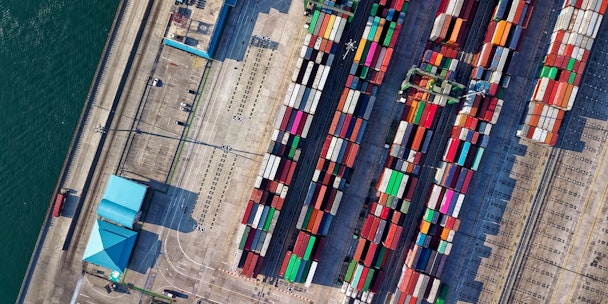New globalization: balancing the shift from efficiency to resilience
Great creativity knows no borders, but multiple external forces defining the 2020s have threatened to disrupt how successfully an idea can travel. From the stagnation of the global trade agenda to shifting geopolitical forces, digital and technological progress to concerns over inequality and climate change, the world is inherently riskier and more complicated than ever – and consumers are demanding more from the brands they engage with and buy from.

In the era of ‘new globalization’, businesses should be looking for and building more resilient and diverse global supply chains
A brand’s reputation is only as good as its supply chain – the foundations upon which it is built. And while the Covid-19 pandemic caught many brands and businesses off guard early on, modern multinationals are no strangers to supply chain shock and disruption. Trade disputes, cyberattacks, commodity price fluctuations and natural disasters frequently test the complexity and interdependence of global supply chains which, in turn, has implications on marketing.
A study conducted by Economist Impact found that Covid-19 has been the most significant disruptive impact on supply chain operations of the past three years, according to 45% of senior supply chain and procurement executive respondents from the US and Europe. Global cyberattacks (36%), major commodity price fluctuations (33%), diverging standards and regulations (32%) and tougher environmental regulations (29%) also feature in the top five.
These recent supply chain disruptions have given rise to a variety of business costs – not just operational but reputational too. When a company struggles to maintain the supply of goods and services, this ripples through to customer complaints and can impact a brand’s reputation. In the context of all of this – plus increased expectations from consumers for greater transparency about where items are coming from and how they are sourced – has created an inflection point for globalization.
Corporations need to adapt the way they do business and marketing in the era of ‘new globalization’.
Globalization was initially focused on creating greater efficiencies across supply chains and the marketing function. But in this ever-complex world, public and private decision makers are exchanging efficiency in favor of resilience; with 60% of the Economist Impact survey respondents agreeing that redundancy (excess capacity) and resilience in their supply chain are more important than speed and efficiency (32%).
A shift from ‘just in time’ to ‘just in case’
“Everyone wants resilient supply chains; the idea that supply chains can withstand shocks and recover quickly is a key focus for both governments and corporations alike,” explains John Ferguson, global practice lead, globalization, trade & finance, Economist Impact. “With benefits also felt by households and consumers, few would argue against supply chain resilience and the impact this has on the brand itself. Many companies are looking at varying strategies of regionalizing and diversifying their supply chains and finding a balance between resilience and efficiency.”
When everything is simple and straightforward, businesses don’t need to worry about resilience but in an increasingly uncertain global trading environment where shocks become more common, businesses need to shift to resilience – moving from a ‘just in time’ approach to ‘just in case’. And while that might seem like a more costly investment now, it will pay off in the long term.
“No-one would wish Covid-19 on the world or demand/supply shocks on companies, but companies have learnt a hell of a lot throughout this terrible period and that’s going to benefit all of us over the next decade because they will be better able to adapt to shocks that happen in the future,” says Ferguson. “Whether it’s food on our grocery shelves or fuel for our cars, it’s about ensuring a more consistent supply of the goods and services consumers need in their lives so they can get them when they need them. That’s one of the small but important benefits to come out of this crisis.”
Renewed trust in global trade
To create a more certain operating environment for companies, an agreed approach between corporations and government around these issues would be conducive and go a long way towards enhancing the resilience of global supply chains, argues Ferguson.
“Trust in global trade is vital if we want to maximize the resilience of supply chains. Supply chains that are increasingly onshored or shifted along geopolitical boundaries are neither efficient not resilient. Rather than incentivizing these shifts, either directly or indirectly, governments should work to rebuild trust in global trade and define a new agenda for progress towards this end.
“We need to create a beneficial trading environment for global companies because trade and foreign direct investment (FDI) is so beneficial for the global economy and particularly for developing countries because with all these major forces there’s a chance they get left behind.”
To achieve a more resilient economy to the benefit of all parties – consumers, producers, companies, brands and citizens – will require all stakeholders at the table to recognize what is happening and start discussions that focus on the solutions for solving this problem.
In the era of ‘new globalization’, businesses should be looking for and building more resilient and diverse global supply chains, to withstand impact and adapt to ever-changing market shifts, but they should also be sustainable and efficient. Finding the right balance is not an easy task, but one that needs to be tackled as soon as possible.
“If the end goal is to create balance between efficiency and resilience, we’re still a long way from finding that comfortable position,” concludes Ferguson. “Companies are still working out how to find the right trade-off between investing for shocks in the future and using that money in other ways right now. The sooner they find this balance, the sooner they will benefit.”
John Ferguson will be joined by a global panel of marketing leaders later this week to discuss the implications of new globalization and why it matters to marketers. Stay tuned for more.
To find out more about Economist Impact, visit here: www.economistimpact.com
Content created with:

Economist Impact
Economist Impact combines the rigour of a think-tank with the creativity of a media brand to engage a globally influential audience. We believe that evidence-based...
Find out more
